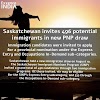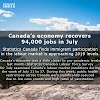Since a 2012 reform to Canada’s Immigration and Refugee Protection Act (IRPA), Canada’s immigration minister has had the legal authority to introduce new economic class pilot programs to welcome immigrants that can help address economic and labour force priority areas across the country.
Other than one special case, each new government monetary class program since that change has been presented as a pilot, incorporating a few ones propelled in 2019, and two new ones that could be presented in 2020.
Therefore, the 2012 reform has been beneficial in several regards. It allows the federal government to launch pilot projects quickly and without parliamentary delay. Simply put, these pilots are trial runs that exist for up to five years and can welcome no more than 2,750 principal applicants under a given pilot per year.
Thusly these pilots decrease the expenses of propelling projects that may demonstrate ineffective. As opposed to conceivably going through months discussing the dispatch of another program, presenting it, and afterward deciding it isn't filling its need, the national government can aircraft testers and afterward decide if to make them perpetual, piece them, or change them.
For these reasons, the federal government’s preferred approach is now to launch pilots rather than introduce permanent programs.
One needs to go back to 2013 for the last federal economic class program that was launched as a permanent one: the Federal Skilled Trades Program (FSTP).
Before 2019, the national government propelled three pilots.
In 2013, it propelled the Beginning up Visa Pilot to invite inventive business visionaries to Canada. The SUV got perpetual in 2018. Up until this point, the program has had blended achievement.
On the one hand, it has enabled Canada to attract entrepreneurial immigrants with high human capital characteristics.
On the other hand, its intake numbers have been low with just several hundred immigrants arriving through it per year. The SUV has not been able to funnel the highest calibre immigration candidates to the business incubators and private equity investors responsible for recruiting immigrants under the program. As a result, the incubators and investors are often overwhelmed with applications from individuals who may not be the best fit. Another challenge is that the overwhelming majority of SUV immigrants go to Toronto and Vancouver, which does not help efforts to promote innovation across Canada.
Propelled in 2015, The Foreigner Financial specialist Funding Asset pilot was acquainted with welcome worker speculators. Notwithstanding, because of constrained intrigue, the national government quit tolerating applications inside a time of its dispatch.
The Atlantic Movement Pilot (AIP), propelled in 2017, was created to help invite more outsiders to Newfoundland and Labrador, Sovereign Edward Island, Nova Scotia, and New Brunswick. The AIP has been the best pilot to date as it has prompted in excess of 4,000 outsiders currently calling Atlantic Canada home. The new command letter of Canada's as of late delegated migration serve shows the government will find a way to make the AIP a perpetual program with in any event 5,000 spots accessible every year.
Other than one special case, each new government monetary class program since that change has been presented as a pilot, incorporating a few ones propelled in 2019, and two new ones that could be presented in 2020.
The rationale for pilots
Before the presentation of the experimental run program approach the government expected to table new monetary class projects to Parliament. These projects would then be audited, discussed, and decided on before they could be opened up to planned outsiders. This procedure, while majority rule, could likewise be moderate. With regards to Canada's migration framework, gradualness can be tricky and make it considerably increasingly hard for managers to fill employments amidst gifted work deficiencies.Therefore, the 2012 reform has been beneficial in several regards. It allows the federal government to launch pilot projects quickly and without parliamentary delay. Simply put, these pilots are trial runs that exist for up to five years and can welcome no more than 2,750 principal applicants under a given pilot per year.
Thusly these pilots decrease the expenses of propelling projects that may demonstrate ineffective. As opposed to conceivably going through months discussing the dispatch of another program, presenting it, and afterward deciding it isn't filling its need, the national government can aircraft testers and afterward decide if to make them perpetual, piece them, or change them.
For these reasons, the federal government’s preferred approach is now to launch pilots rather than introduce permanent programs.
One needs to go back to 2013 for the last federal economic class program that was launched as a permanent one: the Federal Skilled Trades Program (FSTP).
 |
| exxence india |
Pilots before 2019
Before 2019, the national government propelled three pilots.
In 2013, it propelled the Beginning up Visa Pilot to invite inventive business visionaries to Canada. The SUV got perpetual in 2018. Up until this point, the program has had blended achievement.
On the one hand, it has enabled Canada to attract entrepreneurial immigrants with high human capital characteristics.
On the other hand, its intake numbers have been low with just several hundred immigrants arriving through it per year. The SUV has not been able to funnel the highest calibre immigration candidates to the business incubators and private equity investors responsible for recruiting immigrants under the program. As a result, the incubators and investors are often overwhelmed with applications from individuals who may not be the best fit. Another challenge is that the overwhelming majority of SUV immigrants go to Toronto and Vancouver, which does not help efforts to promote innovation across Canada.
Propelled in 2015, The Foreigner Financial specialist Funding Asset pilot was acquainted with welcome worker speculators. Notwithstanding, because of constrained intrigue, the national government quit tolerating applications inside a time of its dispatch.
The Atlantic Movement Pilot (AIP), propelled in 2017, was created to help invite more outsiders to Newfoundland and Labrador, Sovereign Edward Island, Nova Scotia, and New Brunswick. The AIP has been the best pilot to date as it has prompted in excess of 4,000 outsiders currently calling Atlantic Canada home. The new command letter of Canada's as of late delegated migration serve shows the government will find a way to make the AIP a perpetual program with in any event 5,000 spots accessible every year.
New federal pilots in 2019
In January 2019, the federal government announced the launch of the Rural and Northern Immigration Pilot (RNIP). Eleven communities in Ontario, Manitoba, Saskatchewan, Alberta, and British Columbia are now participating in the RNIP as they seek to attract and retain more newcomers. The RNIP is still in its early days but we will get a good sense of its performance towards the second half of 2020.
In February 2019, the government propelled two new pilots for parental figures. The pilots mean to furnish guardians with a more straightforward pathway to changeless living arrangement (PR). Competitors are surveyed for their PR qualification upon application. Likewise, guardians are furnished with occupation-explicit work allows that empower them to switch businesses. This measure shields them from potential instances of manager misuse. Guardians can be joined by their youngsters just as their accomplices who are qualified to get open work grants. Managers never again need a Work Market Effect Appraisal (LMIA) to contract parental figures.
The Agri-Food Immigration Pilot was launched in July 2019 after the federal government announced its introduction during the tabling of its budget in March. Given the importance of the agri-food sector to Canada’s economy and the persistent labour shortages it is facing, the three-year pilot aims to draw newcomers who can fill vacancies in the meat processing and mushroom farming industries.
Two new federal pilots in 2020?
Government pilots have gotten the new ordinary and we may find out around two new ones out of 2020. They incorporate another Metropolitan Candidate Program (MNP) that will look to supplement existing government pilots and the Commonplace Chosen one Program (PNP) in advancing more extensive conveyance of migration the nation over. Besides, the national government showed in Movement Priest Marco Mendicino's command letter it means to dispatch an extra new provincial test case program.
Canada's bureaucratic and commonplace governments presently offer somewhere in the range of 80 financial class pathways which are genuinely extensive regarding inviting outsiders who can help advance monetary improvement in various manners. The presentation of government pilots since 2013 has aided this respect.














0 Comments